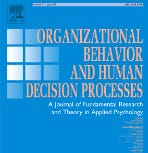New articles in OBHDP (August 14th, 2024)
The credibility dilemma: When acknowledging a (perceived) lack of credibility can make a boast more believable
https://www.sciencedirect.com/science/article/pii/S0749597824000438
Kristina A. Wald, Shereen J. Chaudhry, Jane L. Risen
At some point, most people have felt underestimated or unfairly judged by their work colleagues. People who are judged negatively by others (e.g., as low in competence) often face a dilemma. They may want to self-promote to improve others’ impressions of them, but worry their claims may not seem believable. The authors investigate how people can self-promote most effectively in such cases—which they term the “credibility dilemma.” In particular, they examine the impact of explicitly acknowledging one’s perceived lack of credibility while self-promoting (e.g., “I know this may seem hard to believe, but...”). Across a series of ten studies, the authors demonstrate that credibility disclaimers improve others’ perceptions of the self-promoter’s self-awareness and sincerity (compared to self-promoting without a disclaimer). In contrast, credibility disclaimers are ineffective (and sometimes backfire) when the speaker is already perceived as credible. Taken together, this research suggests that the common advice to avoid drawing attention to one’s flaws may sometimes be unwarranted.
Neuroticism and the sales profession
https://www.sciencedirect.com/science/article/pii/S0749597824000451
Johannes Habel, Selma Kadić-Maglajlić, Nathaniel N. Hartmann, Ad de Jong, Nicolas A. Zacharias, Fabian Kosse
Extensive organizational research has focused on employees’ neuroticism—a key personality trait that predisposes people towards experiencing negative emotions. Neuroticism negatively impacts a range of outcomes, including job performance, job satisfaction, and numerous aspects of mental and behavioral health. Although neuroticism is an enduring trait, it can change throughout an individual’s lifetime. The causes of these changes, however, are poorly understood. Theory suggests that neuroticism (and other personality traits) evolved to help people achieve goals and adapt to their environment. Neuroticism triggers negative emotional states when goals are threatened. Frequent activation of these defensive responses may increase neuroticism over time. The authors propose that business-to-business sales jobs entail frequent experiences of uncertainty, which over time are likely to increase salespeople’s neuroticism. They find support for their proposals across four studies. Their results indicate that personality changes may be substantially influenced by employees’ work roles. In the case of neuroticism, it appears that an environment of uncertainty can have a lasting, detrimental impact on employees’ tendency to experience negative emotional states.
P.S. if you can’t access the full-text let us (m-kouchaki@kellogg.northwestern.edu or mikebaer@asu.edu) know and we’d be happy to share a copy.


